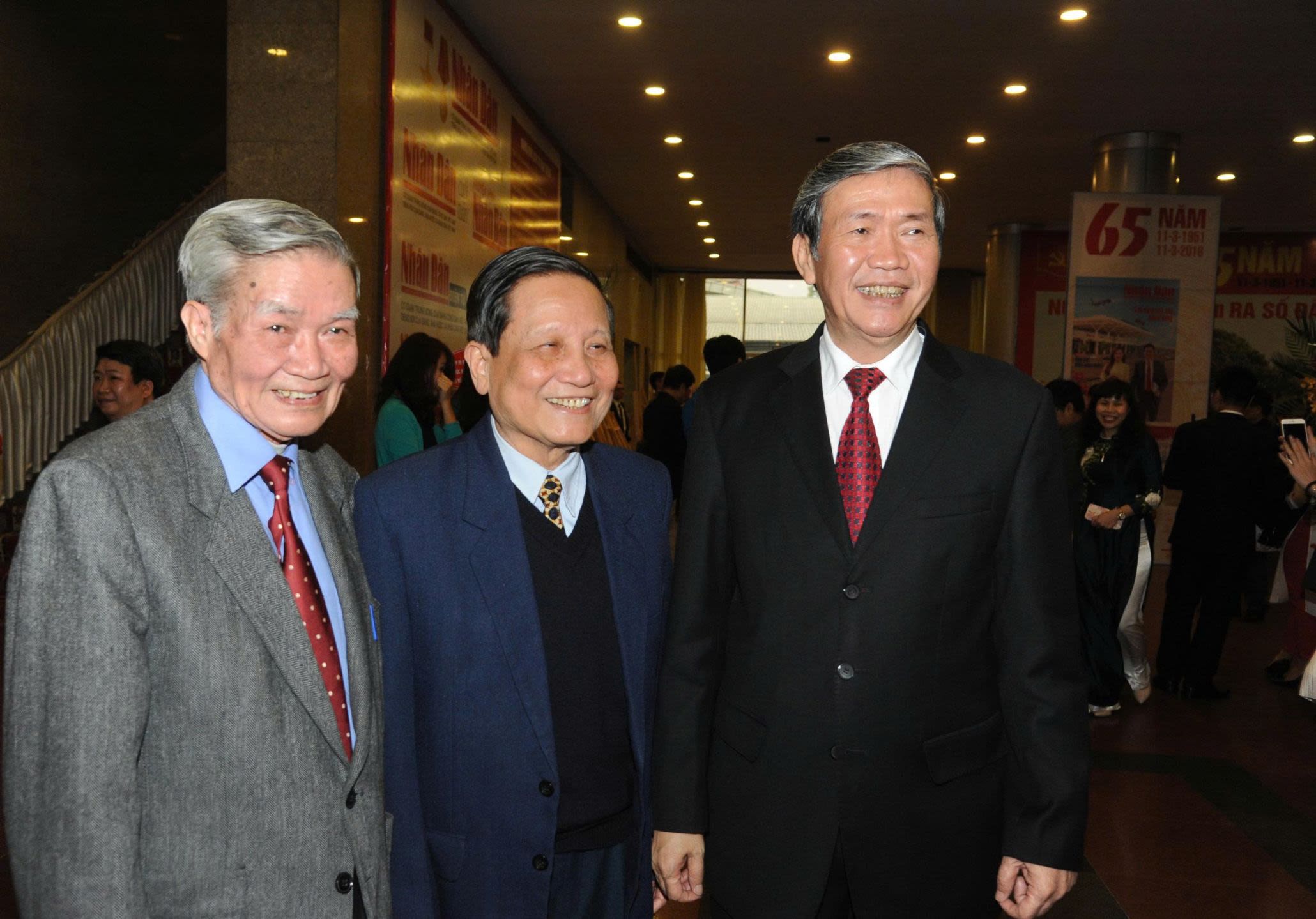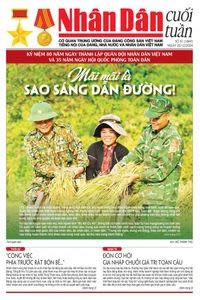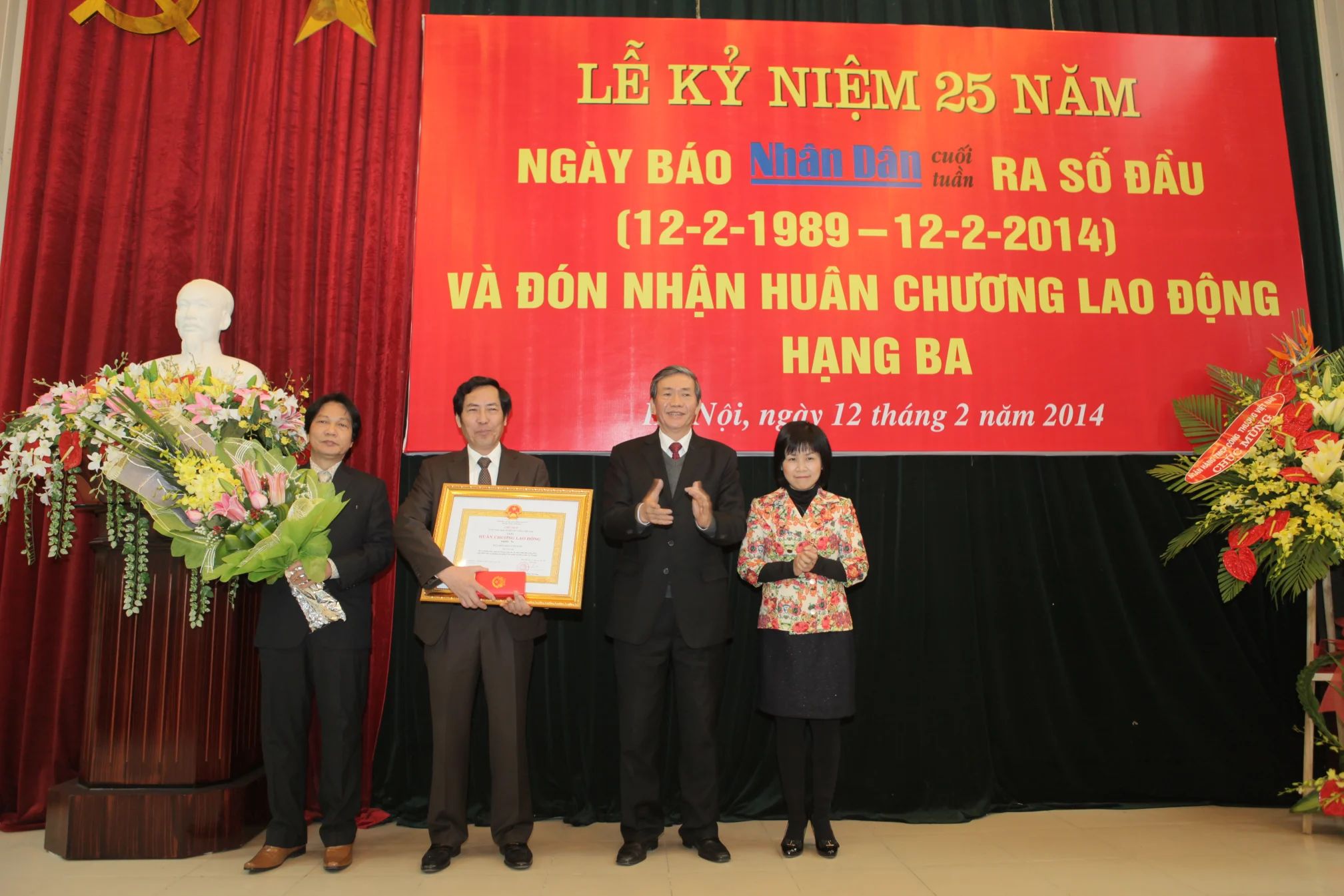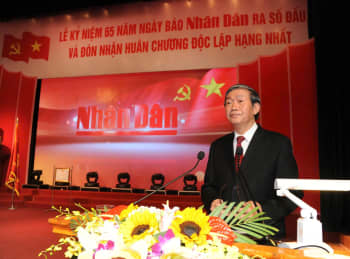JOURNALIST DINH THE HUYNH
The great trainer under the banyan tree at 71 Hang Trong Street
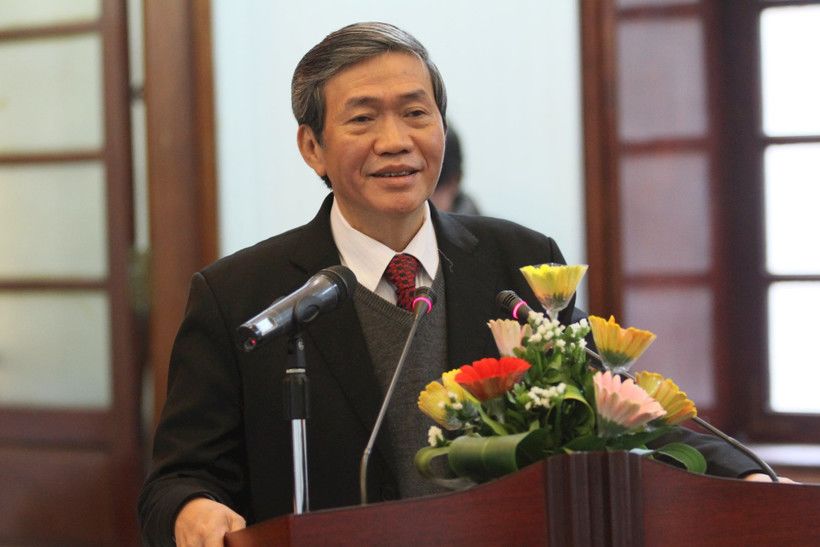
In 1995, I was the candidate from the farthest province from Ha Noi to take the entrance exam for Nhan Dan (People) Newspaper. At just over twenty years old, I left Ha Tinh Radio and Television Station, empty-handed, entering the three-round stressful exam, carrying a few articles and words of encouragement from my teacher — Professor Ha Minh Duc.
He said: “Nhan Dan is a very good place to train journalists. There is Journalist Dinh The Huynh — a sharp writer, with good arguments; students really appreciate him every time we invite him to teach at the Faculty of Journalism.”
I have heard and met the name of journalist Dinh The Huynh. Before that, I participated in an exchange session of the reportage writing class organised by Nguyen Du Writing School at Nhan Dan Newspaper. Dinh The Huynh — who at that time was the Editorial Secretary — chaired the dialogue after the welcome of Editor-in-Chief Huu Tho. During the exchange, there were quite harsh opinions about Nhan Dan Newspaper. The atmosphere was gloomy. Huynh was calm, sharp, and argued each sentence in turn, with convincing and decisive arguments but without imposing. The whole hall was silent and then seemed to explode. At that time, I thought: “This man is truly the one who escaped from the wolves.” And perhaps it was that feeling of curiosity and admiration that made me enter the entrance exam to Nhan Dan Newspaper as if entering a trial by fire.
I passed, with high results in the exam that Huynh himself was given full authority to organise by Editor-in-Chief Huu Tho. The day I went to take the job, Professor Ha Minh Duc called Huynh and introduced: “I have a former student who has just joined your newspaper.” I walked into the office; the table was full of papers and manuscripts. He was working hard and said: “Where did you work before?” – “Ha Tinh Radio and Television Station” – "MC?" I said: "No, the position of MC is for young, beautiful, charming, and fluent girls!" Only then did he look up: "You're quite good at answering questions. That’s how journalists are supposed to be!”
Dinh The Huynh, Member of the Politburo and Standing Member of the Secretariat, with veteran journalists of Nhan Dan newspaper at the 65th anniversary of Nhan Dan's first issue (March 11, 1951 –2016) and the conferment of the First-Class Independence Order. (Photo: Tran Hai)
Dinh The Huynh, Member of the Politburo and Standing Member of the Secretariat, with veteran journalists of Nhan Dan newspaper at the 65th anniversary of Nhan Dan's first issue (March 11, 1951 –2016) and the conferment of the First-Class Independence Order. (Photo: Tran Hai)
For us — journalists who started their career under the banyan tree at 71 Hang Trong Street, the head office of Nhan Dan Newspaper — the memory of journalist Dinh The Huynh is not influenced by title or power. It is the memory of a strict but dedicated teacher, who trained each word like a person, shared Phan Thanh Phong.
I asked to transfer to Nhan Dan Weekend, where poets Le Quang Trang and Nguyen Si Dai — friends of my father — were working. He frowned: “A daughter from a journalist’s family, yet you don’t want to do current affairs but prefer the weekend edition?” Still, he nodded and said, “Just don’t ask to come back later.”
I stayed with Nhan Dan Weekend for 17 years — 16 of those under his management, including 10 years when he served as Editor-in-Chief.
Politburo member Dinh The Huynh presents the Third-Class Labour Order to Nhan Dan Weekend. (Photo: Nhan Dan)
Politburo member Dinh The Huynh presents the Third-Class Labour Order to Nhan Dan Weekend. (Photo: Nhan Dan)
There were just over a dozen of us back then, assigned to various specialised departments. The recruitment exam was merely the first hurdle. The real test came with every article we wrote, every weekly edition we helped publish. He showed no favouritism, but quietly observed each of us through our words. He trained us with a rigor that was almost ruthless.
Each time we submitted our articles for editorial approval, the editorial assistants — Kim Toan, Bao Khanh — would carry the stack of manuscripts from Huynh’s office. We would gather around eagerly, as though awaiting exam results. His comments on our work were often brief but razor-sharp: “Empty theorising!”, “Nonsensical rambling!”, “Careless!”, “Not yet dry behind the ears but already putting on airs!”… Once, he circled the word “dan du” in one of my articles and noted in the margin: “In Romance of the Three Kingdoms, ‘dan du’ means luring into a trap. Here, you mean ‘example’. Don’t overstate it.” I was speechless. But I accepted the critique wholeheartedly.
Occasionally, he gave praise. Once I wrote a short piece on rice balls with sesame salt — a memory from the subsidy era. He read it and said: “Good piece, lively language.” That one sentence kept me quietly happy for an entire month.
Politburo member Dinh The Huynh and the leaders of Nhan Dan newspaper at the conferment ceremony of the First-Class Independence Order on March 9, 2016, held at the Friendship Cultural Palace in Ha Noi. (Photo: Tran Hai)
Politburo member Dinh The Huynh and the leaders of Nhan Dan newspaper at the conferment ceremony of the First-Class Independence Order on March 9, 2016, held at the Friendship Cultural Palace in Ha Noi. (Photo: Tran Hai)
He was strict, but never cruel. He didn’t just train us in the craft; he shaped us as writers with a quiet authority and unwavering principles.
In the memories of young reporters, he was a very real source of fear. Whenever he appeared on one staircase, we would hastily slip away to the other. Once, he caught sight of us and deliberately blocked the way, asking a male reporter: “Do I look like a tiger that you have to avoid?” The reporter froze, speechless.
He trained us by sharp and piercing words that cut straight into our pride — delivered in a manner that felt almost aggressive to the younger generation of journalists. Years later, even as that group of once-young reporters now nears retirement, those painfully honest words are still recalled not with resentment, but as lessons in professionalism rather than scoldings.
Understanding and kind at heart, he encouraged us to pursue further studies, welcomed critical thinking, and always listened — though he rarely lost an argument.
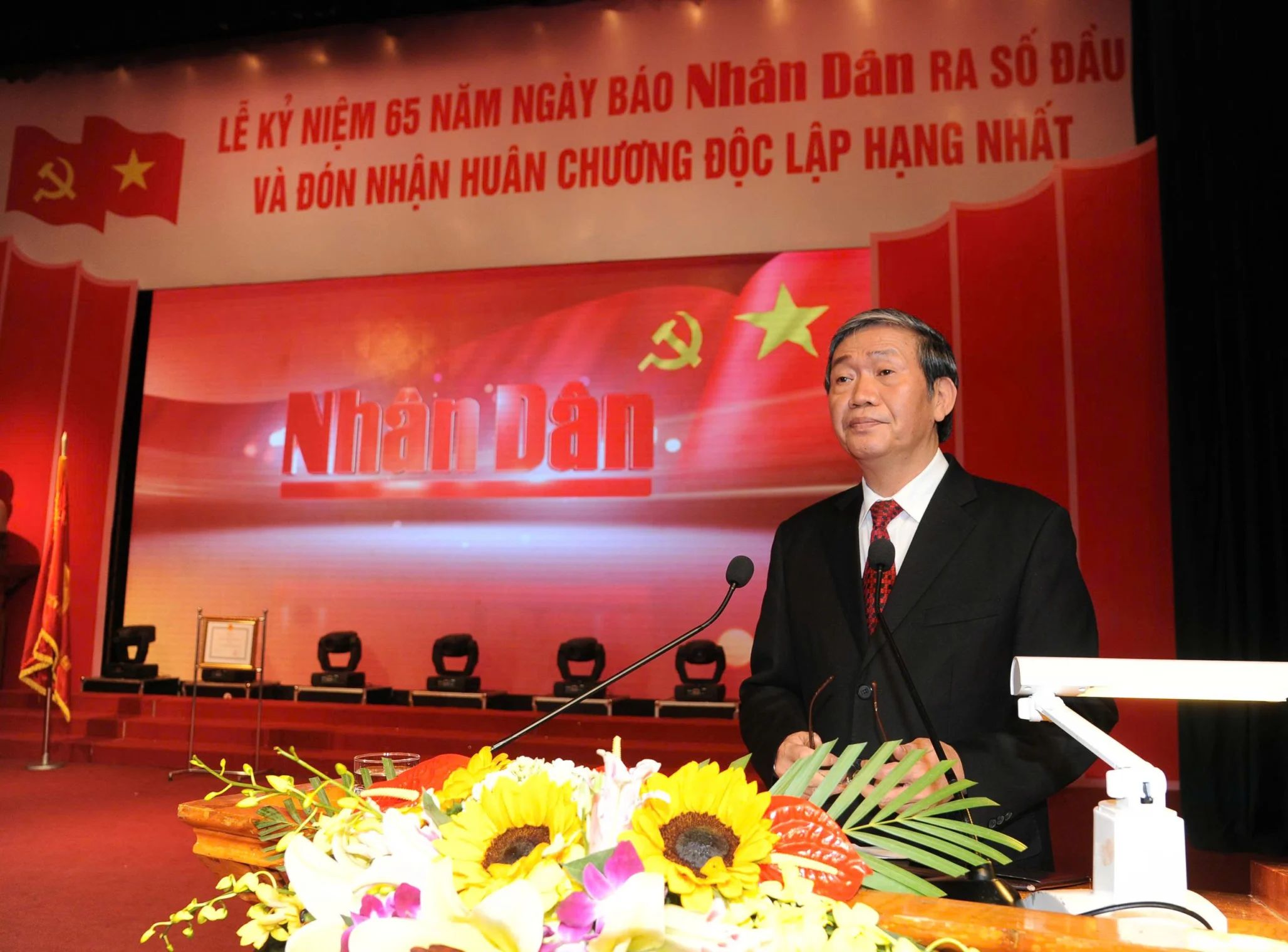
His strictness, in the end, was all for our growth. Throughout his time in management, he never once disciplined anyone. The newspaper operated with a military-like order, yet it was a discipline born of persuasion and personal integrity, not punishment.
He was also a man of deep compassion. I remember when, shortly after a new batch of reporters had been recruited, tragedy struck: two young reporters died in a traffic accident. He fell silent in grief. One evening, after an editing session, he called me over to ask about their families because he learned I came from the same hometown as the two. His voice turned hoarse: “I feel so sorry for them… Sometimes you all should light incense for them.”
He treated colleagues who left the newspaper with the same generosity of spirit. When poet Nguyen Si Dai decided to transfer to another job, he tried every possible way to persuade him to stay. Knowing I was close to Dai’s family, he said: “Tell his wife to talk him out of it. I have never seen anyone leave Nhan Dan Newspaper and find a better job elsewhere.” (His words, with time and thought, proved to be right). He added: “I told the Personnel Department that we were only ‘lending’ Si Dai, and that whenever Si Dai wanted to return, Nhan Dan Newspaper would welcome him back.” Indeed, after several years working elsewhere, Si Dai returned and was reinstated to his former position.
A similar case was that of Quang Hoan from Nhan Dan Monthly, who had previously left the newspaper; upon expressing his wish to come back, he was also supported by Huynh. Both Dai and Hoan went on to make worthy contributions to Nhan Dan Newspaper. This was a profoundly humane, wise and visionary way of leadership.
“Nhan Dan journalists must uphold standards,” Huynh once said. And he truly established those standards, not through rigid regulations, but through a code of values.” — Phan Thanh Phong
As we assumed the role of mentoring younger generations of journalists, we gradually came to appreciate the ethos he had left behind. Maintaining one’s dignity, avoiding ostentation, never treating the press card as a talisman. Attending a press conference meant being measured in speech, refraining from asking careless questions. Every action had to be taken with caution, for the sake of the newspaper’s honour. Never appearing before the media or joining various associations just to exploit the name of the organisation for personal gain. We understood that when we speak, we are no longer just ourselves, we represent Nhan Dan Newspaper. That is a principle.
“Nhan Dan journalists must uphold standards,” Huynh once said. And he truly established those standards, not through rigid regulations, but through a code of values.
Comrade Dinh The Huynh speaks at the closing ceremony of the 9th National Congress of the Viet Nam Journalists Association. Photo: Bich Ngoc – VNA
Comrade Dinh The Huynh speaks at the closing ceremony of the 9th National Congress of the Viet Nam Journalists Association. Photo: Bich Ngoc – VNA
He was also the one who laid the strategic groundwork for Nhan Dan Newspaper. During his tenure, he expanded the network of resident correspondents, took care of staff welfare, provided housing support, organised family retreats, and created opportunities for further education and international exchanges. He held intellectuals and artists in particularly high regard, viewing them as an essential part of the Party newspaper’s identity.
To him, Nhan Dan Newspaper was not merely a political mouthpiece but also a cultural forum — a “home” for writers, including those with differing perspectives. Poet Nguyễn Sĩ Đại recalled that Editor-in-Chief Dinh The Huynh often emphasised that Nhan Dan should be a gathering place for the country’s artists and intellectuals, bringing them closer to the Party and the people. On numerous occasions, he instructed the arts editors to warmly welcome writers and artists — especially those coming from the South — at 71 Hang Trong with courtesy, openness, and heartfelt sincerity. There was a time when Dinh The Huynh even arranged for a Nhan Dan driver to take poets Tran Manh Hao and Vu Quan Phuong to a literary criticism conference in Tam Dao, Vinh Phuc Province. Instances like these were far from rare.
General Secretary To Lam presenting the Ho Chi Minh Order to journalist Dinh The Huynh. (Photo: Nhan Dan Newspaper)
General Secretary To Lam presenting the Ho Chi Minh Order to journalist Dinh The Huynh. (Photo: Nhan Dan Newspaper)
He would send Nhan Dan representatives to attend congresses of the Viet Nam Writers' Association or conferences of young authors to offer gifts, and often to invite writers back to the Nhan Dan Newspaper headquarters for discussions and exchanges, listening to their thoughts, concerns, and aspirations. These practices were later continued by his successors, but the approach and philosophy were his lasting legacy.
He nurtured many ideas to reform the newspaper, from its content and newsroom organisation to team management. Although he did not have enough time to fully realise those ambitions, even after leaving Nhan Dan Newspaper for higher responsibilities, and to this day in retirement, he has continued to follow the newspaper’s every step.
To us, those who began our journalistic careers under the banyan tree at 71 Hang Trong, the memory of journalist Dinh The Huynh is not shaped by his titles or authority. It is the memory of a strict yet dedicated mentor who shaping every word with the same care one might devote to shaping a life.
Journalist Dinh The Huynh with leaders, reporters, and editors at the ceremony marking the 65th anniversary of Nhan Dan Newspaper's first issue and the receipt of the First-Class Independence Order. (Photo: Tran Hai)
Journalist Dinh The Huynh with leaders, reporters, and editors at the ceremony marking the 65th anniversary of Nhan Dan Newspaper's first issue and the receipt of the First-Class Independence Order. (Photo: Tran Hai)
What he left behind continues to flow quietly, like an underground stream within the generation of young reporters once under his guidance, reflected in how they think, live, and hold themselves steady amid the constant shifts of the journalistic profession.
Published: June 2025
Content: Phan Thanh Phong
Translation: NDO
